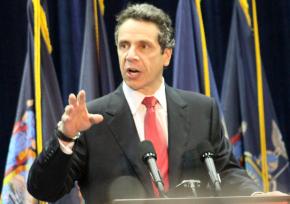New York workers face deep cuts
Gov. Andrew Cuomo claims that wage cuts are unavoidable. explains why that's not true.
NEW YORK'S Democratic Gov. Andrew Cuomo, who was elected with overwhelming union support, is slashing wages for state workers. Cuomo plans on not only forcing public-sector workers to take a two-year wage freeze but making them pay more for their health benefits and take nine days off without pay over the next two years.
The leaders of New York's public employee unions, the Civil Service Employees Association (CSEA) and the Public Employees Federation (PEF), have accepted Cuomo's cuts and are urging their members to ratify them. Faced with Cuomo's threat to lay off up to 9,800 state workers, union leaders talked tough and then capitulated.
In early July, PEF leaders said they would not be bullied into making unnecessary concessions. By the middle of the month, PEF President Ken Brynien released a statement saying, "This was a difficult agreement to reach, but with our members' jobs in peril and the state's fiscal hardship--we've stepped up and made the necessary sacrifices."
Union leaders say they had to choose between the cuts and layoffs. CSEA President Danny Donohue sent a letter to members urging them to ratify the agreement because "it provides job security and prevents massive layoffs."

But that is a choice of their own making.
It was no secret that Cuomo was going to demand massive cuts from state workers. In March, he and the state legislature negotiated a contract calling for $450 million in cuts in labor spending.
While the budget was being considered, CSEA and PEF leaders issued the usual press releases, but there was no campaign to mobilize state workers and appeal for public support. There were no large rallies, no radio or television ads making the unions' case--nothing but business as usual.
Union leaders, like New York's "liberal" Democratic legislators, knew that the spending cuts were unnecessary. They could have extended that state "millionaire's tax"--a surcharge on single individuals with incomes over $200,000 and married couples with incomes over $300,000.
But Cuomo adamantly opposed extending the millionaire's tax. So rather than force a public confrontation with their fellow Democrat, union leaders and state legislators agreed to a budget they knew would require cuts in state workers' wages and benefits.
Now that the deal is done, CSEA and PEF leaders have finally launched a campaign--to persuade their members to ratify the cuts. There are mass mailings and Facebook pages, and union leaders are out meeting with members. Unfortunately, with little organized opposition, the agreement is likely to be ratified.
The cuts will be bad news for all New York public employees. Labor historian Joshua Freeman told the New York Times, "It's a potential pattern setter for other state employees, and even possibly New York City municipal contracts."
The next key test could be the contract that expires in January between the Metropolitan Transit Authority (MTA), which operates New York City's subway and buses, and Transport Workers Union Local 100. The MTA is already threatening layoffs while Local 100 President John Samuelsen has vowed that the union won't take zeroes in its next contract.


